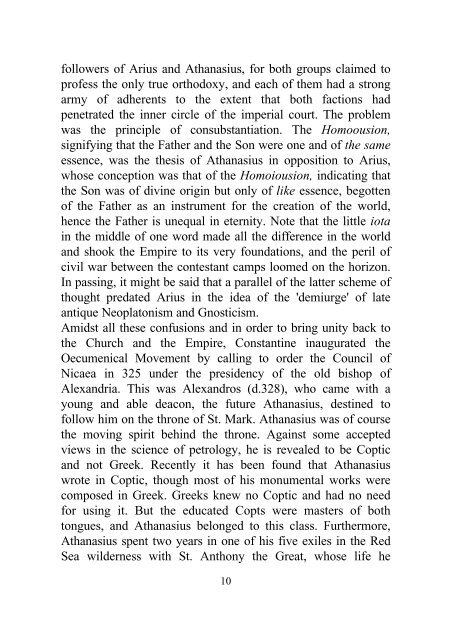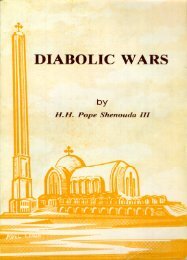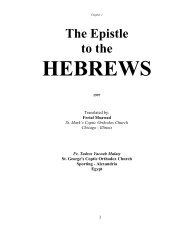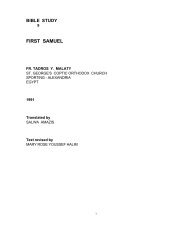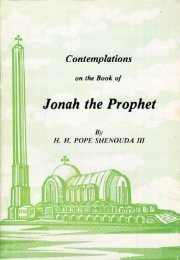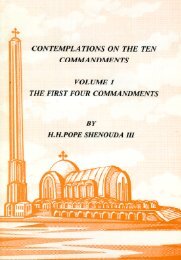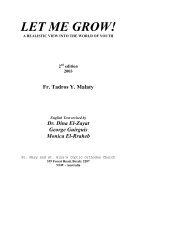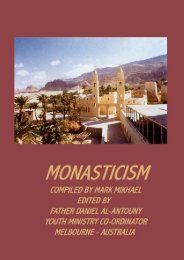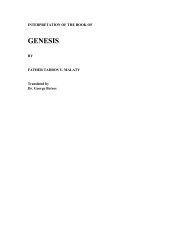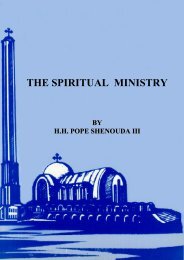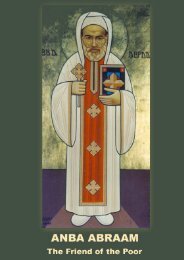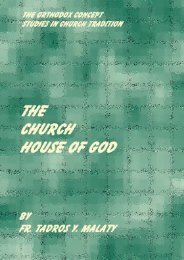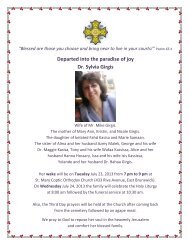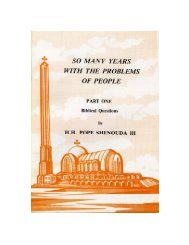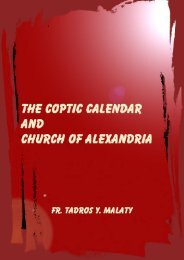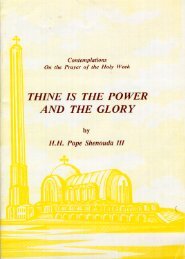the coptic contribution to christian civilisation - Fatherjacob.org
the coptic contribution to christian civilisation - Fatherjacob.org
the coptic contribution to christian civilisation - Fatherjacob.org
Create successful ePaper yourself
Turn your PDF publications into a flip-book with our unique Google optimized e-Paper software.
followers of Arius and Athanasius, for both groups claimed <strong>to</strong>profess <strong>the</strong> only true orthodoxy, and each of <strong>the</strong>m had a strongarmy of adherents <strong>to</strong> <strong>the</strong> extent that both factions hadpenetrated <strong>the</strong> inner circle of <strong>the</strong> imperial court. The problemwas <strong>the</strong> principle of consubstantiation. The Homoousion,signifying that <strong>the</strong> Fa<strong>the</strong>r and <strong>the</strong> Son were one and of <strong>the</strong> sameessence, was <strong>the</strong> <strong>the</strong>sis of Athanasius in opposition <strong>to</strong> Arius,whose conception was that of <strong>the</strong> Homoiousion, indicating that<strong>the</strong> Son was of divine origin but only of like essence, begottenof <strong>the</strong> Fa<strong>the</strong>r as an instrument for <strong>the</strong> creation of <strong>the</strong> world,hence <strong>the</strong> Fa<strong>the</strong>r is unequal in eternity. Note that <strong>the</strong> little iotain <strong>the</strong> middle of one word made all <strong>the</strong> difference in <strong>the</strong> worldand shook <strong>the</strong> Empire <strong>to</strong> its very foundations, and <strong>the</strong> peril ofcivil war between <strong>the</strong> contestant camps loomed on <strong>the</strong> horizon.In passing, it might be said that a parallel of <strong>the</strong> latter scheme ofthought predated Arius in <strong>the</strong> idea of <strong>the</strong> 'demiurge' of lateantique Neopla<strong>to</strong>nism and Gnosticism.Amidst all <strong>the</strong>se confusions and in order <strong>to</strong> bring unity back <strong>to</strong><strong>the</strong> Church and <strong>the</strong> Empire, Constantine inaugurated <strong>the</strong>Oecumenical Movement by calling <strong>to</strong> order <strong>the</strong> Council ofNicaea in 325 under <strong>the</strong> presidency of <strong>the</strong> old bishop ofAlexandria. This was Alexandros (d.328), who came with ayoung and able deacon, <strong>the</strong> future Athanasius, destined <strong>to</strong>follow him on <strong>the</strong> throne of St. Mark. Athanasius was of course<strong>the</strong> moving spirit behind <strong>the</strong> throne. Against some acceptedviews in <strong>the</strong> science of petrology, he is revealed <strong>to</strong> be Copticand not Greek. Recently it has been found that Athanasiuswrote in Coptic, though most of his monumental works werecomposed in Greek. Greeks knew no Coptic and had no needfor using it. But <strong>the</strong> educated Copts were masters of both<strong>to</strong>ngues, and Athanasius belonged <strong>to</strong> this class. Fur<strong>the</strong>rmore,Athanasius spent two years in one of his five exiles in <strong>the</strong> RedSea wilderness with St. Anthony <strong>the</strong> Great, whose life he10


